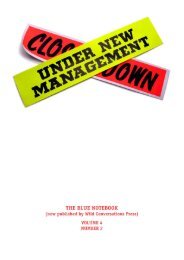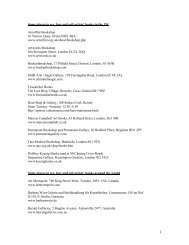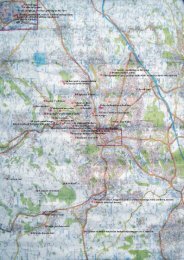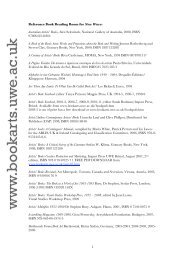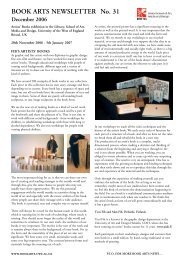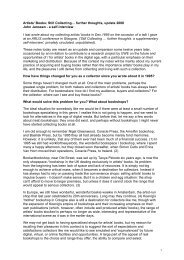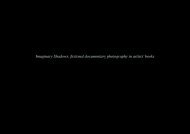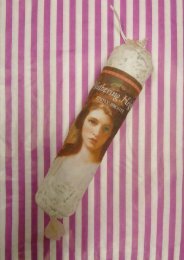Artist's Book Yearbook 2003-2005 - Book Arts - University of the ...
Artist's Book Yearbook 2003-2005 - Book Arts - University of the ...
Artist's Book Yearbook 2003-2005 - Book Arts - University of the ...
You also want an ePaper? Increase the reach of your titles
YUMPU automatically turns print PDFs into web optimized ePapers that Google loves.
Judging by <strong>the</strong> quality <strong>of</strong> image and<br />
construction, I’d want <strong>the</strong> artist to have<br />
achieved more here. The capability<br />
demonstrated in producing a work <strong>of</strong> palpable<br />
material luxury such as this one, is capable <strong>of</strong><br />
twisting that luxury into forms that do more<br />
than play into <strong>the</strong> patterns <strong>of</strong> advertising. I<br />
think <strong>the</strong>re were glimmers <strong>of</strong> intention behind<br />
this book that wanted to present something<br />
more subversive than <strong>the</strong> final product. I don’t<br />
mean uncomfortable, or challenging in that<br />
sense: I think <strong>the</strong>re may have been an intention<br />
originally to create a much more voluptuous<br />
response.<br />
There was an initial situation created by <strong>the</strong><br />
excellent packaging and construction <strong>of</strong> <strong>the</strong><br />
book. Very effective in setting <strong>the</strong> scene for<br />
some sort <strong>of</strong> metaphorical chocolate combat,<br />
but let down, unfortunately, by <strong>the</strong> interior.<br />
But on this showing, I would hope that <strong>the</strong><br />
artist will continue making books, and working<br />
more on how <strong>the</strong>y create <strong>the</strong> content for <strong>the</strong>m.<br />
Paradise is Always Where You’ve Been<br />
Sandy Sykes<br />
Paradise usually suggests and pre-supposes its<br />
opposite. And <strong>the</strong> threat <strong>of</strong> transition from one<br />
to <strong>the</strong> o<strong>the</strong>r. This book’s title “paradise is always<br />
where you’ve been” denies us <strong>the</strong> distinction,<br />
and challenges us to look at paradise depicted<br />
in <strong>the</strong> round. It’s a shocking place.<br />
I’m writing here, looking out at a bright sky, a<br />
few russet trees not touched yet by spring.<br />
A herd <strong>of</strong> placid animals seem to be looking at<br />
me. All very peaceful. Yet this is only removed<br />
geographically from hell, and is less than <strong>the</strong><br />
width <strong>of</strong> an instant away from airwaves<br />
saturated with panic, recrimination, lawlessness,<br />
157<br />
confusion and <strong>the</strong> absence <strong>of</strong> justice. But here,<br />
all is peaceful. There’s a box <strong>of</strong> paper from a<br />
supplier on <strong>the</strong> table. The supplier’s name is<br />
Paradis. I wonder if <strong>the</strong> paper is made from <strong>the</strong><br />
pulp <strong>of</strong> forbidden trees.<br />
I pick up this book, with its heavy wooden<br />
covers. There’s a hole in <strong>the</strong> front <strong>of</strong> <strong>the</strong> book.<br />
I take a deep breath and heave myself into it,<br />
descending (if that is <strong>the</strong> word) into <strong>the</strong><br />
torments <strong>of</strong> paradise. It’s a tight squeeze, and<br />
when I make it I’m not sure that I don’t prefer<br />
my previous world. At least <strong>the</strong>re I have<br />
luxuries. I can wear <strong>the</strong> shroud <strong>of</strong> ignorance<br />
from time to time.<br />
My guide is a dog. A survivor, but not a<br />
reassurance. An accomplished accompanist,<br />
his howl counterpoints <strong>the</strong> main <strong>the</strong>mes and<br />
drags my attention around as I bump along <strong>the</strong><br />
bottom. I’m bombarded with texts and images<br />
that seem to burst all around me like shells.<br />
There’s no peace here, not even in <strong>the</strong> fabrics<br />
<strong>of</strong> <strong>the</strong> body itself. The appeal to Gerald Manley<br />
Hopkins’ Windhover, usually a source <strong>of</strong><br />
satisfied perfection in nature, is winged: a hurt<br />
hawk spirals down and is consumed. There’s<br />
hunger, destruction death, accusation.<br />
Paradise, though. There are tiny glimpses <strong>of</strong><br />
what has failed. It just makes <strong>the</strong> absence<br />
harder to bear. There are territories, loves, losses<br />
touched upon. There was supposed to be a<br />
design to which everything conformed. There<br />
was supposed to be justice: here <strong>the</strong> notion is<br />
poked fun at. It’s just ano<strong>the</strong>r criterion in<br />
God’s box-ticking management-style, and<br />
subject to change without notice. But power<br />
remains. There’s plenty <strong>of</strong> that, for those that<br />
have it, and precious little for those that don’t.<br />
The only power left to some is <strong>the</strong> accusation<br />
<strong>the</strong>ir bodies make after <strong>the</strong>ir death. Their<br />
power is in <strong>the</strong> vacuum made by <strong>the</strong>ir removal<br />
from life. The dog’s howling again. I wonder




